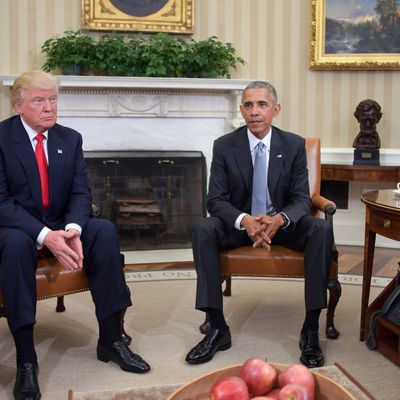
There’s been a lot of confusion lately about Donald Trump and his “Muslim database.” Specifically, a lot of progressives seem to be under the impression that, since winning the election, Trump has taken steps toward forcing all Muslim citizens of the United States to register with the government.
This impression is grounded in two facts:
1. Early in his primary campaign, Trump suggested that he supported the idea of requiring all American Muslims to add their names to some kind of database, so that the security state could keep track of their activities.
2. Trump adviser (and potential Homeland Security pick) Kris Kobach has expressed his support for maintaining a registry of people who have traveled to the United States from Muslim-majority countries on non-immigrant visas.
These are two very different proposals. One is an unconstitutional policy of mass discrimination with little precedent since Japanese internment; the other, a constitutional policy of mass discrimination with little precedent since … the first term of the Obama administration.
From 2002 to 2011, the National Security Entry-Exit Registration System forced “foreign citizens and nationals” who’d come to the U.S. from 25 “havens for terrorists” to register with immigration authorities. Those authorities would then take their photographs and fingerprints and compel them to check in again at a future date.
This system was highly selective. The only people compelled to register were men over the age of 16, who were from a designated country, and in the U.S. on temporary visas, like those for work or tourism. There was no explicit religious or racial component to the system. However, 24 of the 25 countries subject to it were Muslim majority (the other was North Korea).
As Vox’s Dara Lind notes, the primary effect of this project was to make it uniquely difficult for visitors from Muslim-majority countries to overstay their visas.
In theory, the purpose of NSEERS was to catch terrorists, not people who’d violated civil immigration laws. But visa overstays were what the government found. And visa overstays were what it punished … Immigrants who didn’t comply with NSEERS (by, for example, not showing up to follow-up appointments) could be deported. But people registering with NSEERS, and giving their information to the government, made it easier to deport someone who then overstayed his visa than it would have been to deport him if he’d refused to register at all.
The program attracted the ire of civil-rights groups. But when the Obama administration suspended NSEERS in 2011, its official reasoning was more pragmatic than principled: The database was largely redundant since the government already had an automated system that collects and stores information — including biometric data like fingerprints — on nearly everyone who enters the U.S.
“Information obtained from fingerprints, flight manifests, travel and identification documents and intelligence sources is more valuable in determining who poses a potential national security risk,” read a 2012 report by the inspector general for the Department of Homeland Security. “Leaving the regulatory structure of the NSEERS program in place provides no discernible public benefit.”
But even as the administration suspended the program, it left its legal infrastructure in place. Which meant that NSEERS could be revived at the whim of a future administration.
Until this week.
On Thursday, the Department of Homeland Security published a new rule that repeals the regulations undergirding NSEERS.
That move will still leave Trump with a fearsome amount of power to restrict the civil liberties of suspected terrorists. The National Defense Authorization Act provides Trump with the authority to detain U.S. citizens indefinitely, without trial, if he and his military advisers deem them a threat to national security. And in ordering a drone strike against Anwar al-Awlaki, Obama established a precedent for the extrajudicial killing of American citizens suspected of terrorism.
But, by dismantling NSEERS, Obama will make it a bit more difficult for his successor to force Middle Eastern tourists and guest workers to report to their local ICE offices.
Success is made of little victories.






























